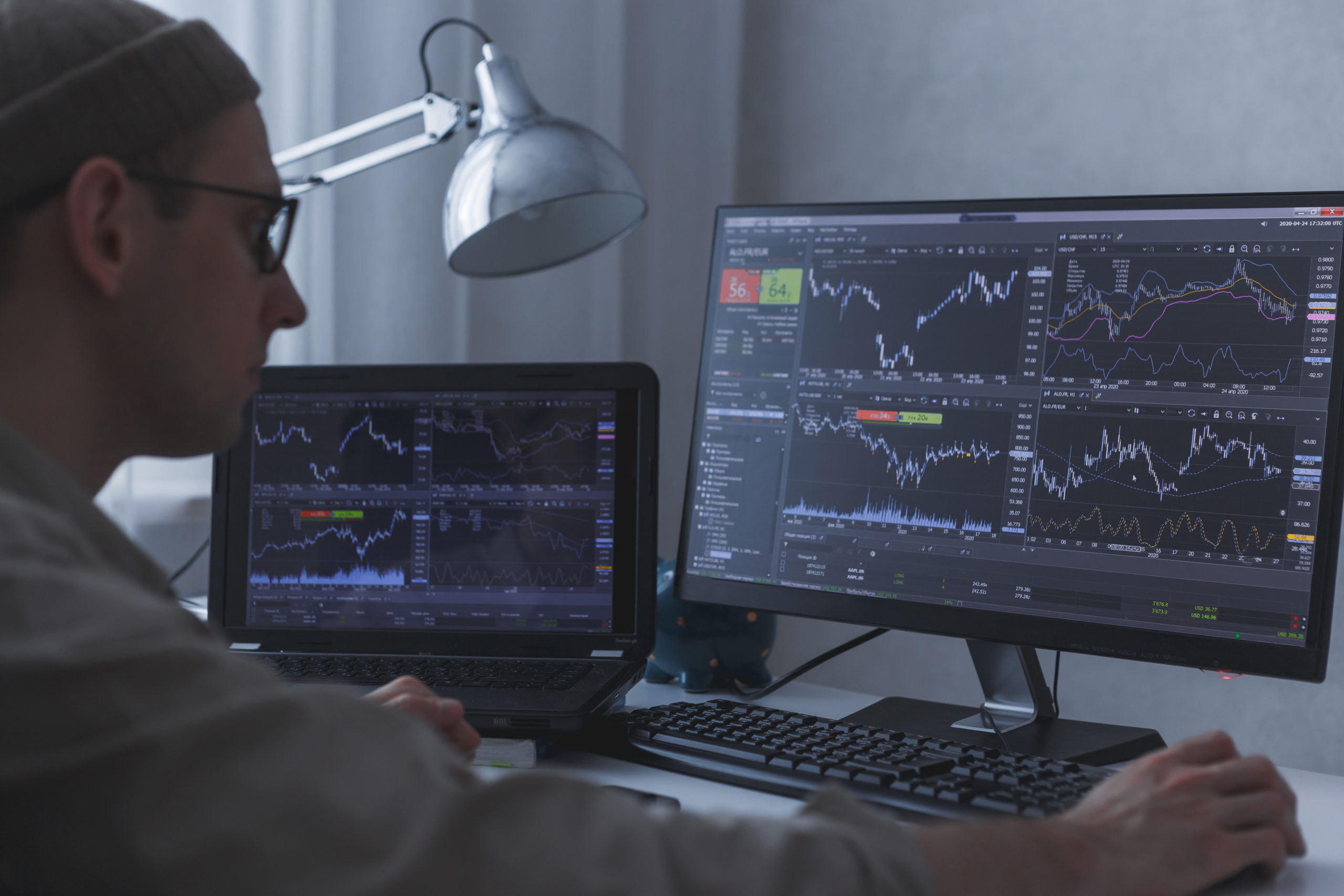A person who is just beginning to know the financial markets usually has to decide where to invest and two of the most common options are Forex or stocks. Read on to find out the best option.
There is something important that you should know:
Over time, money loses its value due to inflation, and a large part of your capital may disappear if you don’t make it work. Keep in mind that this is precisely what banks do when you make a deposit into a bank account: invest it to generate profits. Did you think they kept it in a huge vault like Uncle McPato?
Therefore, you have to constantly make your resources work for you. And you have to work too!
One of the best ways to achieve this goal is by becoming a financial operator; a career full of emotions that begins with choosing a market.
In the following paragraphs you will witness a comparison between two giants of the modern economy: stocks vs Forex!
First of all, we will talk about one of the most popular markets of the moment: the famous stock market.
Shares are financial instruments that grant ownership of a specific company. By virtue of the shares, a person becomes the owner of a company together with the other holders of shares and is entitled to the profits (or losses) that occur. It should be mentioned that the percentage of the company that the investor controls is equal to the number of its shares. The more shares you have compared to the total outstanding, the higher your stake and you can enjoy better profits.
Thousands of people and institutions meet in the stock market to negotiate the securities that grant ownership of different open capital companies.
The stock market has been the preferred market since the industrial revolution, when humans left the economy based on raw materials. However, with the arrival of new technologies and the expansion of the Internet, another market has appeared that counterbalances traditional actions.
Now we will talk about the Forex market.
The currency market, also known as Forex, refers to the market where participants trade and exchange currencies of different nations.
A currency is a form of money officially issued by a nation’s central bank and serves as a medium of exchange within and outside of a specific economy. Since there are companies and individuals that carry out transactions in different nations, a means is needed in which it is possible to exchange different currencies. This is where the forex market comes into play. As a curious fact, since to buy stocks you need money, even those in the stock market trade currencies!
Next, we will analyze the most relevant aspects of Forex vs stocks to determine which is the best investment.
Ease of access
When comparing the stock market vs Forex, the geographic location is an important aspect to consider. Before the advent of the Internet, conducting financial transactions required visiting a physical location (ie, the New York, London stock exchanges, etc.) to trade via faxes and phone calls. Such conditions greatly limited the accessibility of ordinary people to financial markets, who had to operate through a stock broker.
Forex trading, in contrast to the stock market, is not based on physical stock exchanges, but is OTC (over the counter). This means that negotiations are carried out over the Internet and people can access them anytime, anywhere, which translates to superb accessibility.
It should be mentioned that today, negotiations with shares (and in general with any financial instrument) are carried out through the Internet. Anyone who wants to trade, be it currencies or stocks, just select a broker, open an account and download the trading platform.
In this regard, both the Forex and stock markets are easily accessible.
Leverage
At this point of stocks vs Forex we will talk about the leverage that operators can access in both classes of market.
First of all, keep in mind that, both with stocks and in the currency market, the entry requirements are minimal and in some cases, it is possible to open accounts without making any deposit.
However, an important element to consider is the leverage (also known as margin) that can be accessed when trading. This leverage is a kind of loan that the broker makes to its users to open positions.
In the stock market the maximum leverage is 1: 2 (they lend you $ 2 for every dollar you have of capital), while in Forex this ratio can reach 500: 1! You don’t have to be a genius to choose the obvious option. For this reason, the high margins offered by brokers give this point to the currency market.
However, leverage can be a problem for many operators, especially newcomers to the market. This tool allows you to easily multiply the gains, but the same happens with the losses. A single move against the direction you forecast can wipe out your entire trading account. For this reason, it is essential that you use leverage in a responsible way.
Another aspect that can be found when comparing Forex vs the stock market is the differences in the cost of operations. In the case of the currency market, the commissions tend to be lower due to the large number of brokers that exist. On the other hand, stock brokers charge commissions, fees, spreads, and other fees that can significantly increase trading costs.
At first it may seem that these costs do not have a major impact because they are only a few cents, although over time you can see how they accumulate and become a considerable outlay. Small expenses can add up to a large chunk of your profits.
In the second point, the Forex market takes the lead thanks to its higher leverage ratios and lower transaction costs.
Operating times
One of the most obvious differences when comparing trading in Forex vs stocks is the hours of operation. The stock market is limited to the opening and closing hours of physical stock exchanges around the world. On the other hand, Forex is open to the public for 5 days a week and 24 hours a day.
This feature of Forex allows people to trade at any time, which provides ease for those with traditional jobs. It is worth mentioning that despite the fact that the foreign exchange market is widely accessible, there are hours with higher volumes and therefore better opportunities.
One of the characteristics of Forex is that the levels of volatility and liquidity remain relatively constant over time, which allows traders to generate profits in the short term. However, that does not mean that you should become addicted to the market and spend all your time looking at the charts. The market will not go anywhere.
Another positive aspect of currency trading is that if, for example, you open a position and receive crucial information that forces you to close it, you can do it immediately without waiting for the stock market to open.
When deciding between trading stocks or currencies, the advantage of Forex is clear. Its great accessibility is a plus point.
Diversity of offers
One of the most diverse markets is stocks. There you can find the shares of hundreds of open capital companies belonging to a wide variety of sectors and industries. This may seem like a good thing, but such diversity can become confusing and prevent a quick analysis of the available options. Could you imagine having to analyze hundreds of stocks and then buy just one of them?
When observing the Forex market vs the stock market, it is possible to see that with currencies the scenario is significantly different.
In Forex, the most traded instruments are the so-called major pairs (groups of currencies made up of the most important currencies) and the US dollar is part of a large majority of transactions. A trader who is aware of the fundamentals affecting the dollar will have a good overview of the other currencies.
Similarly, most Forex brokers offer one more possibility: CFDs (contracts for differences). These instruments allow you to carry out operations with different assets without actually having them. That means that even on Forex you can trade stocks!
And so, when comparing Forex vs stocks, it is the forex market that takes advantage once again thanks to CFDs.
Go short and long
Due to their nature, shares can only be bought and then sold for a higher value. That means that if you buy a stock and its price goes down, you will have a lot of problems. In the event that you succeed in selling said share, you would still incur losses. This mechanic makes the stock market one-way and you can only generate profits if you buy at a reduced price and sell when the value increases.
Unlike stocks, in Forex you not only have the opportunity to go in the traditional sense of stocks (buy low, sell high), but you can go in the opposite direction. This means that you can buy a currency pair for a high value and then sell it at a lower price.
This particular phenomenon occurs because currencies are traded in pairs. That means that whenever you make a Forex trade, you are buying and selling a currency simultaneously.
conclusion
By conducting a comprehensive comparison between stock trading vs Forex trading, it is possible to find that the clear winner is the forex market.
Leverage in Forex is much more generous than in stocks, allowing you to trade with higher capital and generate better profits. In the same way, in this market you can operate at any time you want and use different kinds of analysis that adapt to your personal trading style.
Another notable element of the foreign exchange market is its great volatility and liquidity, which allows you to carry out very short-term operations or take advantage of market movements over weeks and months. Unlike stocks, with Forex it does not matter if prices rise or fall, since in both directions you can generate profits.
Thanks to its greater accessibility, vast amount of possibilities and superior freedom, Forex manages to position itself as a better investment option than stocks.




